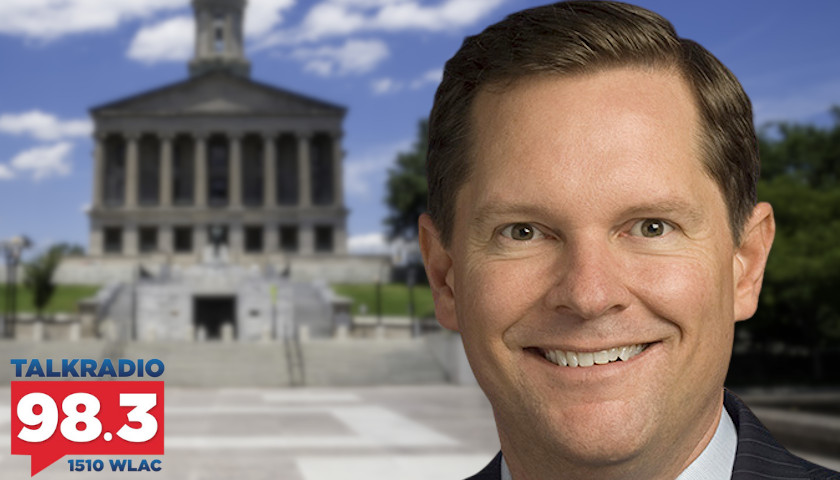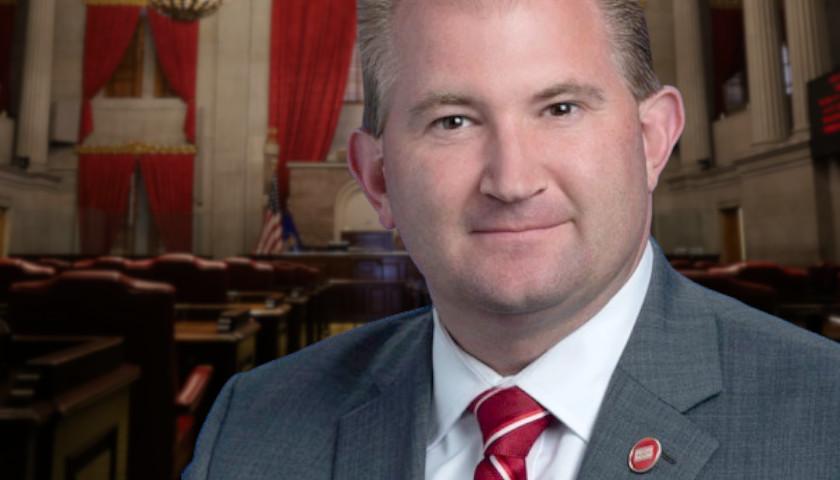Live from Music Row Thursday morning on the Tennessee Star Report with Michael Patrick Leahy – broadcast on Nashville’s Talk Radio 98.3 and 1510 WLAC weekdays from 5:00 a.m. to 8:00 a.m. – Leahy and all-star panelist Carol Swain were joined on the newsmakers line by Tennessee House Speaker Cameron Sexton.
During the show, Sexton went on to explain the current big-ticket items in the Tennessee House and how they were looking forward to seeing the language in Governor Lee’s criminal justice package. He noted that in response to the recent refugee resettlement issue, several counties have proposed resolutions and that they are still deciding on which one will be the best way to move forward.
Leahy: Cam Sexton. Good morning, Cam!
Sexton: Good morning.
Leahy: Well, Speaker Sexton, the Tennessee General Assembly is in session. They’ve been in session since last week. What are the big items on your agenda?
Sexton: We’re moving pretty good right now. We’re getting things up and going. I think there are some healthcare reforms. Looking at medicine. Also some transparency issues. I think we are waiting to see the governor’s criminal justice package.
We’re still having meetings about and figure out that situation and what’s going on with services. And then members are starting to file their pieces of legislation. So we’re looking forward to having some very good discussions.
Leahy: So I saw that in the state Senate earlier this week, the committee passed a constitutional amendment on Right-to-Work. Where is that in the House? Is that an important issue in this session?
Sexton: It is. It’s one of the things where we’ve been a right to work state for a long long time. And it’s one of the things where we are wanting to solidify it in the state constitution and put it on the ballot to make sure Tennessee stays that way.
Leahy: So I guess if it passes this session it would have to pass in the next session as well. And then it would be on the ballot perhaps in 2022. Is that how it works?
Sexton: Yeah, that would be about right. There are only so many constitutional amendments that can technically go on a ballot. You don’t want to put too many on voting for your electoral officials. We have to be careful not to overload it. That looks like that could be the path for that.
Leahy: In December, governor Lee made a very unpopular decision to say yes to more refugees resettled in Tennessee when he could have said no. He apparently he did not consult with members of the Tennessee General Assembly at that time. And of course, the Tennessee General Assembly filed a lawsuit against the government resettling refugees without out approval and forcing us to pay for it.
A violation we argued, I guess of the 10th amendment. There were suggestions that a number of members of the House would submit bills to push back on that. Can you tell us what the sentiment of the House is on that? And what you think if any will come in terms of push back against the Governor’s decision on that and what if any pushback will come on the governor’s decision on that?
Sexton: We’re still receiving resolutions from county commissioners. They’re sending them into their members on passing things locally to where they are saying they don’t want refugees in their areas at this point in time. One bill has already been filed by Rep Griffey.
There’s a resolution that I think that’s going to be filed here in the next 24 hours that will get into the committee system. Just basically saying that it’s a passive bill that the general assembly disagrees with the direction the governor is going. There are still two or three bills out there. They are working on language. I have not seen it yet.
There’s a good possibility that three more pieces of legislation could drop sometime in the next seven to 10 days that would also do some additional things on that front. So, we’re still waiting for members and having discussions with them and understanding the direction that they’re wanting us to go finding that point that we can all agree. Instead of passing four different types of resolutions or bills or pass the resolution that we think is the best way to go.
Leahy: Has the governor given you or any other member of the Tennessee General Assembly any indication that he is reconsidering his unpopular decision to say yes to refugees in the state?
Sexton: No. I think the Governor made his decision and he did what he thought was right and he’s going to stick to it. Last week the Lieutenant Governor and myself and the Governor sat down and had a conversation. He explained it to us in more detail.
But at the same time, one of the district courts has basically said that the states don’t have the ability to make that decision themselves. They can be consulted but they can’t make that decision. And they kind of struck it down at this point. So I think they’re still waiting to see the approach at that end. If what happened in the state of Tennessee and other states can’t even be factored into the President’s decision.
Leahy: Most on appeal that it’s likely to be reversed that decision. Carol Swain has a question for you but before we get to that. How many counties have a resolution saying they don’t want refugees in their counties?
Sexton: Oh, man. I’d have to go back and look. I haven’t been keeping up with it. Easily a half a dozen that’s why I haven’t seen it. I think there is a lot out there.
Leahy: Among our listeners, there’s a lot of support for counties saying “no” to refugees. Carol Swain is in the studio with us. Speaker Sexton, Carol has a question for you.
Swain: I’m interested in the relationship between the legislature and the governor going forward. I felt that his decision about the refugees disrespected the legislature by not informing you as well as others what he was intending to do. So going forward, do you think that he is more likely to discuss decisions with you and other key lawmakers before he makes public announcements?
Sexton: Yes; I mean, I think so. We had some discussions in the last week about various other things – where we kind of gave back our opinion and some issues that we might have with it. And started having some good discussions. We’re still working on all that sort of stuff. We’re here to help the governor but also the General Assembly’s independent body as well.
We’re made up of 99 members in the House. So there’s a lot of interest in conservative policies. And so we’re doing our best to continue to work with the governor, the senate and whoever on any issue that we agree with. Even if we disagree on one issue or would like to amend one issue that’s in effect how we’re going to operate on the next issue.
Leahy: You mentioned earlier that the governor was about to announce a criminal justice reform package. Will that becoming at the state address or will he be making an announcement to that effect?
Sexton: I’m not sure yet. I know they’re working on it. There have been conversations about concepts and things that they are looking at. I think that the task force report that they’ve put forth has a lot of great ideas in it. We are waiting on the direction that he and his staff would like to take to state. And so we know it’s coming.
I don’t know if he’s going to wait for the state of the state but that’s his decision. But we’re willing to sit down with him and have any input that we can have before it gets into the committee system. And just try to understand everything better and run it through our system. And just start thinking about it. So I’m looking forward to having that discussion with him. So does leader Lambert as well as we go forward.
Leahy: Do you have any ideas about what the components of that criminal justice reform will be?
Sexton: No. Until you really see the wording and concepts the wording is very important. So we’re kind of in a wait and see approach and letting them finish doing their job. And we’re kind of waiting to see the language.
Leahy: Carol Swain has another question for you Speaker Sexton.
Swain: More or less a comment. I think the governor needs to be very careful that he doesn’t set up an adversarial relationship with the Republican legislature. And that we would have better legislation for the state if some of the legislators or their staff or people you have confidence in are involved in the decision-making process before something is dumped.
Sexton: I agree. One of the things that we’ve always talked about it is having the ability, on every issue, I can’t speak for the Senate. There are certain people in the Houe that are very passionate about that issue. So we are letting them think it through and being a part, if not the decision but thinking through and maybe being able to add some extra stuff that they’ve uncovered over the years of being there. I’m hopeful that we’ll get to that level and really be able to make great policy.
Leahy: Final question for you Speaker Sexton? What’s new? What’s different?
Sexton: (Laughs) Life is much different. There’s a lot more on my plate. I have a great staff and a great leadership team. And we’re really looking forward to working together and working with the Senate and the Governor this year. And really continuing the trend that we’ve put the state on in years. And every day is different. Every day I go in and you might expect one thing and get something different.
Listen to the third hour here:
– – –
Tune in weekdays from 5:00 – 8:00 am to the Tennessee Star Report with Michael Patrick Leahy on Talk Radio 98.3 FM WLAC 1510. Listen online at iHeart Radio.





